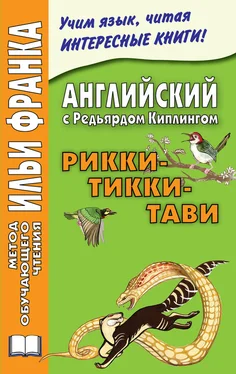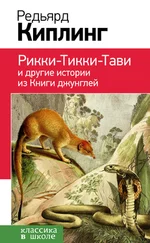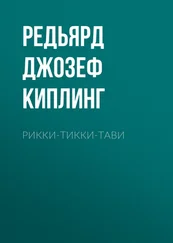
 Little Toomai was too frightened to speak, but Kala Nag was behind him, and Toomai made a sign with his hand, and the elephant caught him up in his trunk and held him level with Pudmini’s forehead, in front of the great Petersen Sahib. Then Little Toomai covered his face with his hands, for he was only a child, and except where elephants were concerned, he was just as bashful as a child could be.
Little Toomai was too frightened to speak, but Kala Nag was behind him, and Toomai made a sign with his hand, and the elephant caught him up in his trunk and held him level with Pudmini’s forehead, in front of the great Petersen Sahib. Then Little Toomai covered his face with his hands, for he was only a child, and except where elephants were concerned, he was just as bashful as a child could be.
“Oho(ого) !” said Petersen Sahib, smiling underneath his mustache(улыбаясь в усы; to smile – улыбаться ) , “and why didst thou teach thy elephant that trick(а зачем ты научил своего слона этому фокусу) ? Was it to help thee steal green corn from the roofs of the houses when the ears are put out to dry(не для того ли, чтобы помогать тебе воровать зеленое зерно с крыш домов, когда колосья раскладывают сушиться; ear – ухо; колос / у злаковых / ; dry – сухой; to dry – сушить / ся /) ?”
“Not green corn, Protector of the Poor(не зеленое зерно, Покровитель Бедных; to protect – защищать ) , – melons(/а/ дыни) ,” said Little Toomai, and all the men sitting about broke into a roar of laughter(и все сидевшие вокруг разразились хохотом; to break – ломать, разбивать; разразиться; roar – рев; хохот; roar of laughter – взрыв смеха, хохота ) . Most of them had taught their elephants that trick when they were boys(большинство из них учили своих слонов этому трюку, когда были мальчишками; to teach ) . Little Toomai was hanging eight feet up in the air(Маленький Тумаи висел на восемь футов в воздухе; to hang – висеть ) , and he wished very much that he were eight feet underground(но очень хотел бы /оказаться/ на восемь футов под землей; to wish – желать, хотеть ).

 “Oho!” said Petersen Sahib, smiling underneath his mustache, “and why didst thou teach thy elephant that trick? Was it to help thee steal green corn from the roofs of the houses when the ears are put out to dry?”
“Oho!” said Petersen Sahib, smiling underneath his mustache, “and why didst thou teach thy elephant that trick? Was it to help thee steal green corn from the roofs of the houses when the ears are put out to dry?”
“Not green corn, Protector of the Poor, – melons,” said Little Toomai, and all the men sitting about broke into a roar of laughter. Most of them had taught their elephants that trick when they were boys. Little Toomai was hanging eight feet up in the air, and he wished very much that he were eight feet underground.
“He is Toomai, my son, Sahib(это Тумаи, мой сын, Сахиб) ,” said Big Toomai, scowling(сказал Большой Тумаи, нахмурясь; to scowl – хмуриться, хмурить брови ) . “He is a very bad boy(он очень плохой мальчик) , and he will end in a jail, Sahib(и закончит /жизнь/ в тюрьме, Сахиб; to end – кончать / ся / , заканчивать / ся / ; end – конец ) .”
“Of that I have my doubts(/ну/, в этом я имею сомнения = сомневаюсь) ,” said Petersen Sahib. “A boy who can face a full Keddah at his age does not end in jails(мальчик, который способен смело войти в полный кеддах в его возрасте, не закончит /жизнь/ в тюрьме; to face – стоять лицом к / чему-либо / ; смело смотреть в лицо / опасности / ; face – лицо ) . See, little one, here are four annas to spend in sweetmeats because thou hast a little head under that great thatch of hair(смотри, малыш, вот тебе четыре анна, чтобы потратить их на сладости, потому что у тебя есть маленькая голова под густыми волосами; hast / уст. / = has; thatch – солома, тростник; густые волосы, шевелюра ) . In time thou mayest become a hunter too(со временем ты, может быть, тоже станешь охотником; mayest / уст. / = may ) .” Big Toomai scowled more than ever(Большой Тумаи нахмурился больше прежнего) . “Remember, though, that Keddahs are not good for children to play in(помни, однако, что кеддахи не хороши = неподходящее место для детских игр) ,” Petersen Sahib went on(продолжал Петерсен Сахиб; to go on ).

 “He is Toomai, my son, Sahib,” said Big Toomai, scowling. “He is a very bad boy, and he will end in a jail, Sahib.”
“He is Toomai, my son, Sahib,” said Big Toomai, scowling. “He is a very bad boy, and he will end in a jail, Sahib.”
“Of that I have my doubts,” said Petersen Sahib. “A boy who can face a full Keddah at his age does not end in jails. See, little one, here are four annas to spend in sweetmeats because thou hast a little head under that great thatch of hair. In time thou mayest become a hunter too.” Big Toomai scowled more than ever. “Remember, though, that Keddahs are not good for children to play in,” Petersen Sahib went on.
“Must I never go there, Sahib(/значит/, я не должен входить туда, Сахиб; never – никогда; вовсе ) ?” asked Little Toomai with a big gasp(спросил Маленький Тумаи с глубоким вздохом).
“Yes(да) .” Petersen Sahib smiled again(Петерсен Сахиб снова улыбнулся) . “When thou hast seen the elephants dance(пока не увидишь, как танцуют слоны; to dance – танцевать ) . That is the proper time(это /и/ есть подходящее время) . Come to me when thou hast seen the elephants dance(приди ко мне, когда ты увидишь, как танцуют слоны) , and then I will let thee go into all the Keddahs(и тогда я позволю тебе входить во все кеддахи; to let – выпускать; разрешать, позволять ) .”
There was another roar of laughter(раздался новый взрыв хохота) , for that is an old joke among elephant-catchers(так как это была старая шутка среди охотников на слонов) , and it means just never(и она означала просто «никогда»; to mean – намереваться, иметь в виду; значить, означать ) . There are great cleared flat places hidden away in the forests that are called elephants’ ball-rooms(в глубине лесов скрываются огромные открытые плоские места = поляны , которые называются бальными залами слонов; to hide; to clear – расчищать, прочищать; освобождать, очищать ) , but even these are only found by accident(но даже если их случайно находят; accident – несчастный случай; катастрофа; случай; случайность ) , and no man has ever seen the elephants dance(ни один человек никогда не видел, как танцуют слоны) . When a driver boasts of his skill and bravery the other drivers say(когда погонщик хвастается своим мастерством и храбростью, другие погонщики говорят ему; to boast – хвастать / ся / , кичиться ) , “And when didst thou see the elephants dance(а когда ты видел, как танцуют слоны; didst / уст. / = did ) ?”
Читать дальше
Конец ознакомительного отрывка
Купить книгу


 Little Toomai was too frightened to speak, but Kala Nag was behind him, and Toomai made a sign with his hand, and the elephant caught him up in his trunk and held him level with Pudmini’s forehead, in front of the great Petersen Sahib. Then Little Toomai covered his face with his hands, for he was only a child, and except where elephants were concerned, he was just as bashful as a child could be.
Little Toomai was too frightened to speak, but Kala Nag was behind him, and Toomai made a sign with his hand, and the elephant caught him up in his trunk and held him level with Pudmini’s forehead, in front of the great Petersen Sahib. Then Little Toomai covered his face with his hands, for he was only a child, and except where elephants were concerned, he was just as bashful as a child could be.











